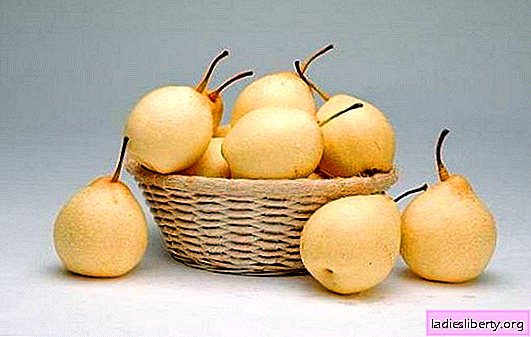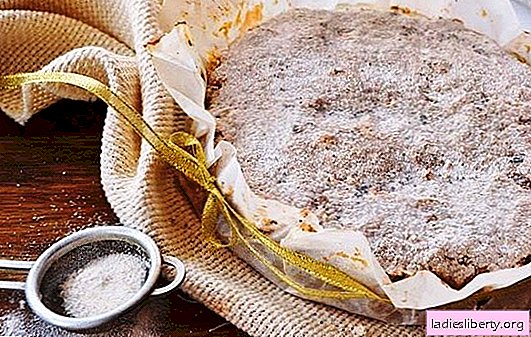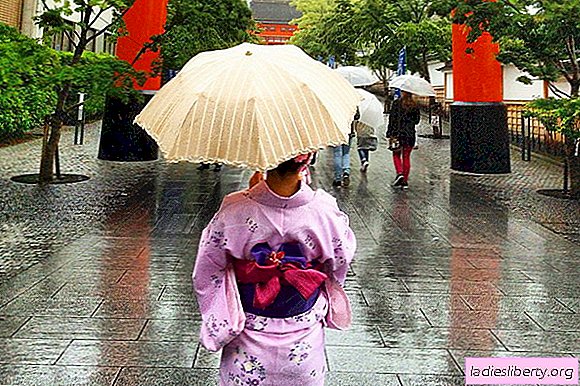
One of the oldest fruit crops, pear, is not only distinguished by high taste, but also extremely useful qualities. The Chinese pear is a rare pearl among other varieties of fruit, the importance of which is difficult to overestimate for healthy and dietary nutrition.
What is special about Chinese pear and its benefits
Chinese pear is the common name for a group of varieties having somewhat similar characteristics and originating from the Yamanashi variety, which did not gain popularity due to its low taste, as a result of which were corrected by breeders.
Other names for the Chinese pear are Nashi, Taiwanese, Japanese, Asian, and sand.
In total, more than a hundred varieties of Chinese pear are cultivated in the world, but in the soil and climatic conditions of Russia, only a few have become widespread, the leaders among which are:
• Jose;
• Olympic (Greater Korean);
• Morning freshness;
• Scythe;
• Crystal;
• Far Eastern (a hybrid form of Chinese, Ussuri and European pears).
A variety of varieties creates variants of the skin color (but often it is covered with brown specks), the size and shape of the fruit, the prevalence of sweetness or sourness in the taste.
But almost all of them have white, very juicy pulp, dense and slightly crispy.
Some varieties are harvested unripe - they ripen on store shelves or in the homes of buyers. A ripe pear is stored longer and better in the refrigerator, but before treating it, it is recommended to warm the fruit for 2-4 hours in room heat to fully reveal its taste.
Like other pears, Chinese eat fresh, put them on jam and juice, homemade alcoholic drinks, prepare desserts and main dishes with them, turn them into dried fruits, which make an excellent compote.
Almost no culinary treatment reduces the benefits of Chinese pears, except that under the influence of high temperatures, the content of vitamins (for example, ascorbic acid) decreases.
In Chinese pears there are vitamins - C, B5, B1, E, A and K, minerals - calcium, vanadium, phosphorus, magnesium, silicon, rubidium, iron, fluorine, but the highest potassium content - eaten pear delivers 10% of the daily needs for it.
And dried fruits are characterized by a high iron content.
The pear strengthens the musculoskeletal system, and although calcium is very important for this, the effectiveness of the Chinese pear in this case is more due to boron:
• the mineral is necessary for the complete assimilation of calcium and phosphorus;
• with a deficiency of boron, growth slows down and bone fragility increases;
• 1 fruit contains about 270-380% of its daily intake.
Due to the fact that Chinese pears practically do not accumulate chlorine and sodium, they are appropriate in salt-free diets and are useful for the treatment of kidney diseases. Plus, the content of the natural antiseptic arbutin gives the fruit effective in urethritis and cystitis.
The energy value of the pear is about 42 kcal per 100 g, which makes it, together with other characteristics, one of the best fruits for a light diet designed for weight loss.
And here it is important to recall that the dried pear contains as much as 270 kcal per 100 g.
Also, the benefits of the Chinese pear are manifested in the following:
• increased coagulation of liquid blood;
• normalization of the functioning of the gallbladder;
• improving adaptation to cold weather conditions;
• lowering the acidity of gastric juice;
• improving the cardiovascular system (including reducing the risks of developing stroke and heart attack).
How else are the benefits of the Chinese pear
The Chinese pear has an average glycemic index of 33 units, and it contains more than two times less glucose and sucrose than fructose.
Fructose is 1.8 times sweeter than glucose and is absorbed much more slowly, without causing spikes in blood sugar levels. Plus fructose and the fact that it has almost no destructive effect on tooth enamel.
Pears that have undergone heat treatment, as well as hot drinks from them, relieve the condition with angina and laryngitis, are effective for severe coughing with suffocation.
To improve mood, increase efficiency and enhance brain activity, get rid of symptoms of severe fatigue and apathy - it is enough to eat one or two pears and the result will appear as quickly and brightly as it would be from milk chocolate.
What is the benefits of a Chinese pear for weight loss and beauty
Speaking about the importance of a pear to reduce weight and transform the figure, the low water content and low saturation of the fruit with harmful carbohydrates should add the water content in it - up to 84%.
Much has been said by nutritionists and fitness instructors about the importance of drinking for weight loss.
And here you can consume a real vitamin “cocktail” (in terms of B9 content, the pear is superior to black and red currants), saturated with essential oils, tannins, starch, organic acids, and volatile products.
Adequate fluid intake is necessary for:
• rapid metabolism;
• cleansing the body of toxins and toxins (which is also affected by pear fiber and pectins);
• saturation of tissues with oxygen;
• muscle growth.
The latter is also affected by the phosphorus necessary for the synthesis of proteins and new cells.
At the same time, Chinese pears still have the ability to remove excess fluid.
A healthy metabolism is reflected on the skin - it becomes radiant, clean, supple and tender.
Pear, finally, saturates well and for a long time, protecting it from overeating, and if a Chinese pear is chosen for a snack, it is very good to combine it with low-fat cheese.
It is scientifically proven that regular consumption of pears helps break down fats and prevents the addition of extra centimeters at the waist and hips.
Does Chinese Pear Harm
It seems that there is nothing dangerous in the Chinese pear, however, like any other fruit or vegetable, in principle, it cannot be called completely and completely harmless to humans.
A group of varieties of Chinese pear is saturated with coarse fiber, which the body consumes a lot of energy to absorb, besides, treating yourself with some varieties of Chinese pear, you can feel their granular structure - these are scleroids, strictly speaking - dead fruit cells with a complex composition (lime, non-digestible wax coutime and silica).
So, in order to avoid harm from the Chinese pear, it is better to refuse it for serious diseases of the gastrointestinal tract (including gastritis, ulcer, hemorrhoids) requiring dietary, easily digestible food.
The Chinese pear will definitely bring harm only in acute and chronic pancreatitis, but you can drink compote from it (without eating pieces of fruit).
But before eating a pear, it is also prudent for a healthy person to peel it from the skin - to improve transportability and give the fruit a marketable appearance, they are often treated with chemical preparations and, in addition, harmful elements from fertilizers and a polluted environment accumulate in the pear's skin ( pears can accumulate lead, thallium and strontium).
Unripe pears are especially difficult for digestion, and even if they are left to jam, this will not fix the situation, moreover, their useful composition did not have time to form and there will be no benefit from the treat. So if you come across unripe pears - it is better to throw them away without regrets.
But there is harm in overripe Chinese pears - methyl alcohol, lactic and acetic acids, and acetaldehyde are formed in the fruits. Which again - leads to an upset gastrointestinal tract.
Due to the pronounced diuretic effect, it is not recommended to eat a pear at night.
It is optimal to eat pears 30 minutes after the main meal.
At the same time, it is important to remember that the Chinese pear does not mix well with meat and dairy products, it is good with sour milk, and you should not drink it with water, if you are thirsty, it is better to pour a cup of green tea.











